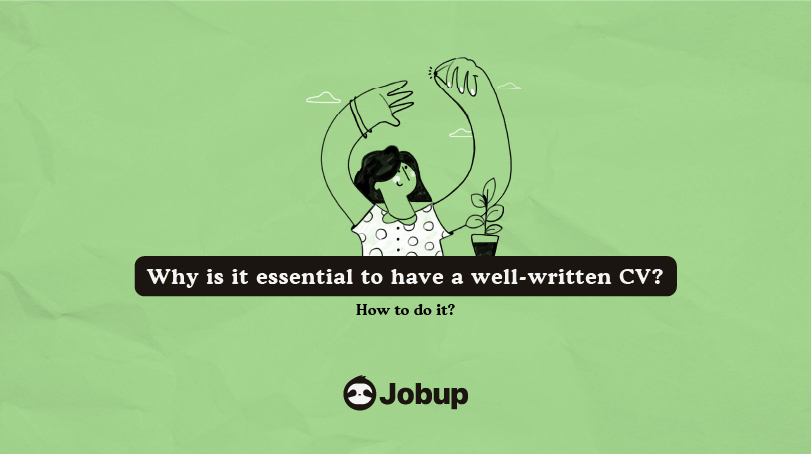The majority of people will only remember about their CV - Curriculum Vitae when they are searching for a job or are going to do so in the near future. Of course, it's significant, particularly in those circumstances; however, in addition to job applications, resumes have other uses. It gives you a glimpse of your accomplishments, encourages you to do more, lets you understand your shortcomings, allows you to know the goals you set before, and helps you develop new career goals.Therefore, it constantly needs updates, and it has to show your best possible version of all the times.
The "curriculum vitae" is originally a Latin term, which says "the story of your life." So, your CV or Resume should precisely reflect your professional life and experience.
Why is a CV important?
Generally speaking, a CV is a small document that gives you an opportunity to show your best qualities. You are going to "sell" yourself with the help of that document. It sells your experience, skills, qualifications and shows that you are THE ONE, you are the right person for the job.
Making the first impression and doing it well is very important nowadays because the job market is highly competitive. Your CV is that primary impression because it’s your first contact with your future employers. It is a bridge between employers and employees. So, you need to get it right. Besides, even when you are asking for a promotion in the same company, the CV is again your best chance to make a good impression. It’s the “tool” that will set you apart in the mind of a recruiter. You should believe that you are the best candidate for any job you want; if you don't believe in that, no one will. Your personal traits, skills, experience, and everything else that you can bring to the table has to be written down in a way that appeals to those reading it. Since companies cannot interview all candidates, they screen for interviews by selecting and rejecting resumes. Due to the large number of applicants, hiring managers usually spend 20 seconds on each resume; these few seconds determine whether your experience meets requirements or not. The employer judges the applicant's organizational and communication skills through their writing style, which is the key to choosing or rejecting an interview. So, it will decide whether your name will be in the "interview" pile or the "thanks, but no thanks" pile. You can achieve or destroy your game in the first few minutes. Therefore, it is essential that your resume is correct, truthful, inspiring, and reflects your skills in the most effective way.
How to make a good CV?
1. Have a Creative Design
Before starting to create your ideal CV, you should think about the format. It should be noted from the rest before even they start to read. There are many CV templates that you can download. After that, you can modify it to meet your requirements. Use bullet points and headlines; it always makes the data easy to understand. What is the distinctive feature of your CV that you want to catch their eyes with? Choose some of them and make sure they intend to attract your future employers.
2. Make your CV Adaptable
The resume must also be adaptable. It should change for each job you apply for. We are not talking about large-scale rewriting every time. Still, different jobs require different skills and experience; you should be willing to slightly modify your resume so that each time you apply, the details they are looking for are put first. Naturally, of course, it should include your qualifications, work experience, and professional knowledge, but all of them must be adaptive. Start with your most recent experience and go back in time.
Job posts can vary from company to company. Some of them are long and very detailed, and others are short. Still, in both cases, job postings are typically broken into several sections, and you should find the part about desired qualifications of the applicant. Analyze it, learn what they want, find some keywords and modify your resume accordingly. Write about as many of the qualifications as possible, detailing how you used that skill or exhibited that quality in a work, volunteer, academic, or co-curricular role. Whenever possible, point to any positive results or recognition you achieved while applying the skill.
3. No mistakes/typos are acceptable.
Make sure your resume is written consistently and without typos. Writing your resume in a professional format is essential, allowing you to stand out from the competition where everyone does their best. So if you want to stand out from the number of applications, make your resume stand out.
An error-free resume says you are professional and care about your performance.
4. Include a personal summary
It is an optional part; however, it will be better if you consider adding a summary. Think of it as a brief profile of you. This is an excellent way for an employer to understand your personality as an alternative to the standard way of listing qualifications and experience.
5. Ask for an Advice
If you are genuinely motivated to find a specific job within a particular field, interview professionals in the area and ask them how they can describe their roles. What are the characteristics they have that helped them to succeed in that position? Reach out to college alumni through available networks, talk to LinkedIn contacts and friends to generate a maximum amount of information about that profession since it can help you to adapt your resume better. Moreover, in-depth information about the job will also help you during the interview since interviewers will see that you are interested and motivated about that position.
So if you want to make a good impression and win the competition, a well-written CV is essential for you. Go to our website, try our Resume Builder for having a creatively designed resume!

_410.jpg)
_48.jpg)
_764.jpg)